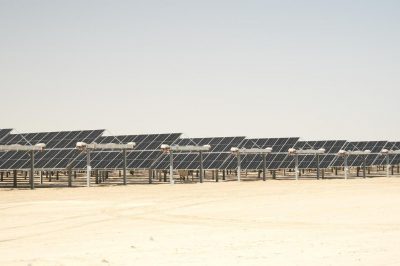According to experts, China and the Gulf nations are developing stronger economic ties in changing global dynamics, notably in renewable energy, financial markets, and electric vehicles.
The collaboration was evident at the World Economic Forum Special Meeting held in Riyadh, Saudi Arabia, based on their substantial contributions to the global GDP and shared commitment to sustainable development. Monday was the last day of the meeting.
“Gulf countries are actively participating in addressing climate change and demonstrating considerable potential for the renewable energy sector, supported by several technical innovation capabilities,” commented Gao Jifan, chairman and CEO of Trina Solar, one of China’s largest manufacturers of photovoltaic panels.
Reflecting this potential, Trina Solar plans to open the largest photovoltaic plant in the UAE by 2027 in an initiative supported by the China-UAE Industrial Capacity Cooperation Zone.
Lina Noureddin, Managing Director and Chief Executive Officer of Lamar Holding, stressed the critical role of Chinese enterprises in the Kingdom of Saudi Arabia’s 2030 vision. According to him, Chinese companies have been attracted to Saudi Arabia’s shift from traditional government-led projects into more collaborative public and private partnerships.
In addition, she noted the social benefits of such partnerships, including the development of local talent and direct foreign investment by Chinese financial institutions.
“The ambitions of the Gulf Cooperation Council to develop clean energy opportunities will only bind the region more closely to China,” said Ben Simpfendorfer, a partner at the Hong Kong office of the international consulting firm Oliver Wyman.
Also Read: India’s Space Advancements and Its Implications for Pakistan and South Asia
The Gulf Cooperation Council, which includes six Gulf states: Bahrain, Kuwait, Oman, Qatar, Saudi Arabia, and the United Arab Emirates, has a crucial role in developing this partnership.
China, which has a significant stake in the global market for batteries, wind, and lithium production, has become one of the most critical players in the clean energy sector.
According to UN Comtrade Data, China’s exports of lithium batteries to the Gulf Cooperation Council countries increased by 26 % from 2021 to 2022 from 2021 to 2022, with a remarkable 99 % increase in the first three quarters of 2023.
Another promising area for cooperation between China and the Gulf Cooperation Council is finance integration, where reforms are taking place on both sides to facilitate a greater flow of funds and investment opportunities.
In these reforms, Saudi Arabia eased foreign ownership restrictions and set up its own derivatives market. The United Arab Emirates is aligning its trading week with global norms to increase liquidity. In addition, the Chinese Stock Connect program made it easier to access its mainland market and contributed to a growing number of investments from across borders.
Wilfred Yiu, Hong Kong Exchanges and Clearing’s Deputy Chief Executive Officer said, “The importance of China and the Gulf region as growth engines is increasingly recognized as global economic growth shifts east,”
There is also evidence of this trend in the finance sector:
According to EY’s MENA IPO Eye report for Q4, 2023, the Middle East and North Africa markets saw 48 IPOs, raising $10.7 billion. Similarly, in early 2023, Asia, with China at its core, led the way in the volume of initial public offerings.
“The diversity of partnerships between countries in the Middle East and China shows a commitment to collective growth, progress, and development,” commented Omar Al Futtaim, Chief Executive Officer of The Al Fujairah Group.
This growth is illustrated by the group’s cooperation with BYD, a Chinese automobile manufacturer, to introduce EVs into the United Arab Emirates and Saudi Arabia.
Al Futtaim said, “These initiatives highlight our commercial and economic objectives, as well as our commitment to innovative solutions that consider and improve the health of the environment and society; we’re looking forward to pursuing business partnerships that will benefit us both.”

Atika Hassan is pursuing her MPhil in International Relations from University of the Punjab, Lahore, Pakistan. She loves to explore the fascinating world of international and domestic politics and can be reached out at atikahassan241@yahoo.com







